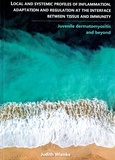Local and systemic profiles of inflammation, adaptation and regulation at the interface between tissue and immunity
Summary
Inflammation is the body’s natural reaction to fight infections. During inflammation, cells of the immune system, like T cells, move from the bloodstream into inflamed tissues. Specific signaling molecules are released there. The amount and combination of signaling molecules reflects the type and intensity of inflammation. These molecules can thereby serve as a source of information (biomarker) about inflammation.
In part 1 of this thesis we investigated how biomarkers in blood could aid to improve the treatment of children with a rare inflammatory disease of muscle and skin, juvenile dermatomyositis (JDM). We demonstrated that specific biomarkers reliably reflect the severity and activity of the disease, and may predict response to treatment. These biomarkers have now been implemented into patient care and can thereby contribute to “precision medicine”: treatment tailored to individual needs of patients.
Next to biomarker-focused research, we investigated in part 2 how T cells adapt to tissue environments. We found that the process of leaving the bloodstream could play an important role in preparing them for tissue environments. Moreover, we showed that during pregnancy, T cells at the interface between mother and child in the uterus, behave in a peculiar manner. Especially regulatory T cells, whose job it is to keep immune responses in check, were very active at this site. Their strong inhibitory function may warrant the prevention of an immune response against the child, which is an important prerequisite for a successful pregnancy. Finally, during preeclampsia, the balance between essential signaling molecules proved to be disturbed.
